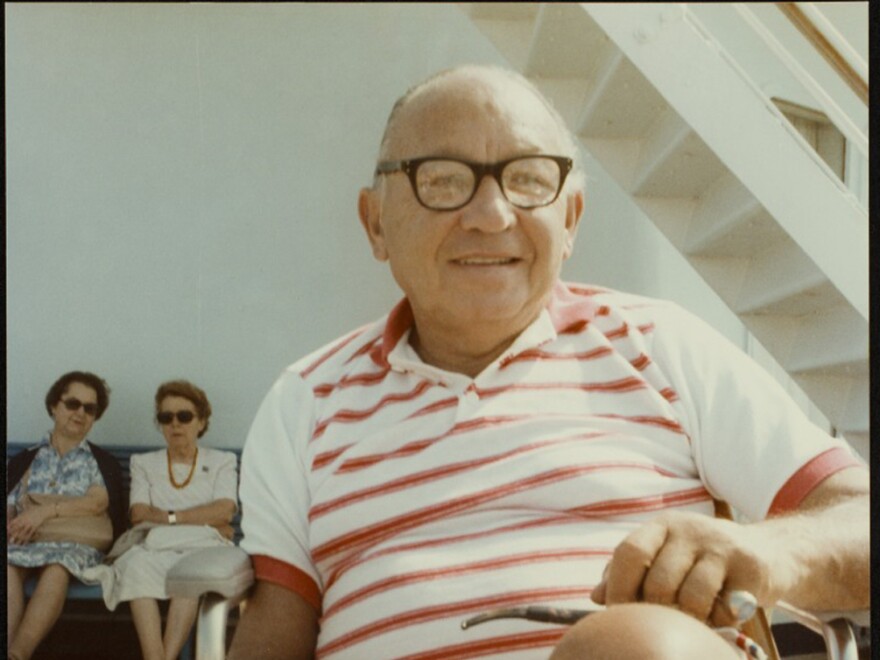It was 30 years ago today that a single American hostage was killed by terrorists during the hijacking of a cruise ship by pro-Palestinian terrorists in the Mediterranean Sea. Leon Klinghoffer's death was the inspiration for a controversial opera, The Death of Klinghoffer, composed by John Adams, with a libretto by Alice Goodman and directed by Peter Sellars.
Klinghoffer's daughters, Ilsa and Lisa Klinghoffer, still object to his portrayal in that work. Now they're telling their own version of the story, by donating the family's photographs and documents to an institution in New York.

Ilsa Klinghoffer says she and her sister saved everything, including dozens of photos: from their parents' wedding, the Jersey Shore and the dinner parties they liked to throw. "They were the most glamorous couple," she recalls. "And they supported each other, in sickness and in health."
The Klinghoffer sisters saved letters of condolence from heads of state and ordinary people all over the world. Lisa Klinghoffer says it's all been piling up for decades in their New York apartments. "In closets, shopping bags, in dressers," she says. "We're starting to think, 'Well, what's going to happen to these?'"
So the Klinghoffer sisters donated their collection to the American Jewish Historical Society at the Center for Jewish History in New York. On the 30th anniversary of the hijacking, the sisters are also making a rare public appearance at an event hosted by the institution. Executive Director Rachel Lithgow says everybody else has gotten to tell their story — except them.
"They have never really gotten up on a stage and described their own personal story in a public way before," Lithgow says.
The Klinghoffer sisters were adults when the Achille Lauro was hijacked in October 1985. Their father was shot and then pushed overboard in his wheelchair. The story was big news. It was retold in several made-for-TV movies and again in the opera The Death of Klinghoffer.
The Klinghoffer sisters say they were initially excited about the opera. They went to see it on opening night at the Brooklyn Academy of Music in 1991. And they hated it. Lisa Klinghoffer says the opera's creators reduced their parents to a stereotype of rich American Jews.
"It really wasn't about our family," Lisa Klinghoffer says. "They took an event that happened in history for their own agenda, to show their own political views. And they chose what happened to my father — they didn't really care who he was, or anything really about him."
"I, still to this day, am puzzled by their reaction," John Adams says. "Both my librettist and I feel that we did great dignity not only to Leon Klinghoffer, and also to his wife."
Adams points to the opera's final aria, when Marilyn Klinghoffer — who is dying from cancer — learns that her husband was murdered. She laments that she should have been the one to die.
"It's a terrible, terrible, tragic moment," Adams says. "I don't see how anybody could see this and think that it's insensitive to these two people. Or that's it's some kind of propaganda on behalf of terrorism, which is what people said about it."
When the work was presented at the Metropolitan Opera in New York last year, it was picketed by hundreds of protesters, many of whom called it anti-Semitic. That's a charge its creators have long denied. But the Met agreed to cancel international movie theater presentations, which in turn prompted pushback from the opera's supporters. Adams thinks all of the heated rhetoric may be short-sighted.
"My hunch is that 100 years from now, Leon Klinghoffer will be remembered in part by my opera. And in a good sense," the composer says.
That's no comfort to Ilsa and Lisa Klinghoffer. They want people to know their parents the way they did.
"We try to put a face on terrorism," Lisa Klinghoffer says. "It isn't just this abstract idea that you see in movies or operas. It actually happened to a real family. And we're it."
The Klinghoffer sisters say that's one reason they're donating their archives to the American Jewish Historical Society, where they'll be available for anyone who wants to see them.
Copyright 2020 NPR. To see more, visit https://www.npr.org. 9(MDAwMTM1NDgzMDEyMzg2MDcwMzJjODJiYQ004))





